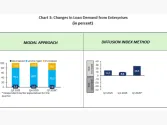
Why Singapore’s co-living sector is gaining traction
The market is set to have 3,000 additional keys by the end of the year.
Singapore's nascent co-living market is currently fragmented and small compared to other established markets, but will create significant opportunities for investors and operators in 2023 and beyond. According to JLL, the market has the potential to expand by close to 3,000 keys by the end of 2023, building on the 9,000 rooms currently managed by 20 active co-living providers, as consumers seek more affordable and flexible housing options.
According to JLL analysis, the recent demand for co-living spaces has been fuelled by transitory factors. Covid-19 induced housing construction delays, the combined effects of increasing property prices, rising interest rates and residential property market cooling measures, have channelled housing demand into Singapore’s co-living market.
Additionally, a broader shift in societal attitudes towards living arrangements and homeownership, supported by a greater prioritisation of flexibility and personal lifestyles, should foster demand for co-living space in the medium-to-longer term. Furthermore, the normalisation of remote/hybrid work and the increased focus on personal space, wellness, and connectivity will continue to drive demand for co-living as a more flexible and affordable housing option that caters to changing demands.
"The combined effects of the Covid-19 pandemic, short-term imbalances in the residential market and regulatory policies have spurred the recent growth of co-living in Singapore. However, the sector is poised to maintain its growth trajectory as more sustainable drivers come into play. Structural demographic changes, evolving consumer preference and economic shifts provide us with confidence that occupier and investor demand for co-living spaces will continue to grow and mature in the medium-to-long term," says Chia Siew Chuin, Head of Residential Research, Singapore, JLL.
Capital flows into co-living properties in Singapore have accelerated over the past few years from a diverse pool of investors. According to over 30 domestic and international investors surveyed by JLL, approximately 80% of respondents indicated that they had invested or are interested in investing in co-living real estate in Singapore. JLL analysis revealed that family offices and high net worth individuals (HNWIs) are most optimistic about the sector and are particularly drawn to co-living as a means of stable income and portfolio diversification.
According to JLL, 40.7% of the investors surveyed indicated their preference to co-invest in real estate with operators to mitigate risks and align interests. The survey also revealed that family offices and HNWIs are most optimistic about the sector and are particularly drawn to co-living due to stable income and portfolio diversification.
“Unlike hotels, many co-living operators are start-ups with relatively limited track records, especially in Asia. To mitigate risk and ensure that interests are aligned, the majority of investors we speak to indicate that they preferred to co-invest in real estate with operators. On the other side of the market, well-capitalised co-living operators, such as those backed by private equity firms, have the flexibility of deploying an asset-heavy strategy,” says Tan Ling Wei, Senior Vice President, Investment Sales, Asia Pacific, JLL Hotels & Hospitality Group.
JLL also expects opportunities to arise from repurposing commercial buildings, shophouses, and hotel assets for co-living. As the market matures, early investors are expected to create attractive investment opportunities for private and institutional sources of capital by disposing of stabilised assets. JLL survey data supports this trend, with many investors indicating a holding period of less than five years. Additionally, the market could anticipate more opportunities for repurposing government properties into co-living spaces as the government becomes increasingly receptive to the concept.
Read the full report here.



















 Advertise
Advertise






